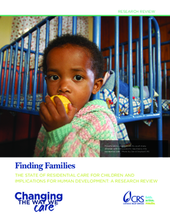Despite decades of rigorous research in a wide array of contexts, evidence illustrates that institutionalization i.e., placement in long-term residential care, also referred to as orphanages, negatively impacts the cognitive, physical and social development of children. Research also shows that the effects are intensified the longer a child is in care and the younger the child is at the time of placement. In some countries, residential care is experiencing exponential growth despite the evidence illustrating that it is harmful to children.
This review is a summary of the literature, from multiple disciplines, on residential child care and its deleterious effects on children. It also points towards a way forward, however, underscoring the need to move definitively away from placement in residential care as a first response and instead focus efforts on prevention of family separation and provision of family-based and supportive community environments.
Despite the challenges that children in residential care face, one theme that emerges is the profound resiliency of children once removed from residential care. Children demonstrate an extraordinary ability to rebound from early obstacles, while adoption and family-centered alternatives have proven far more effective at safeguarding the rights and well-being of children, further adding to the impetus behind moving past residential care except in short-term emergency situations when no safe options with family members exist.

